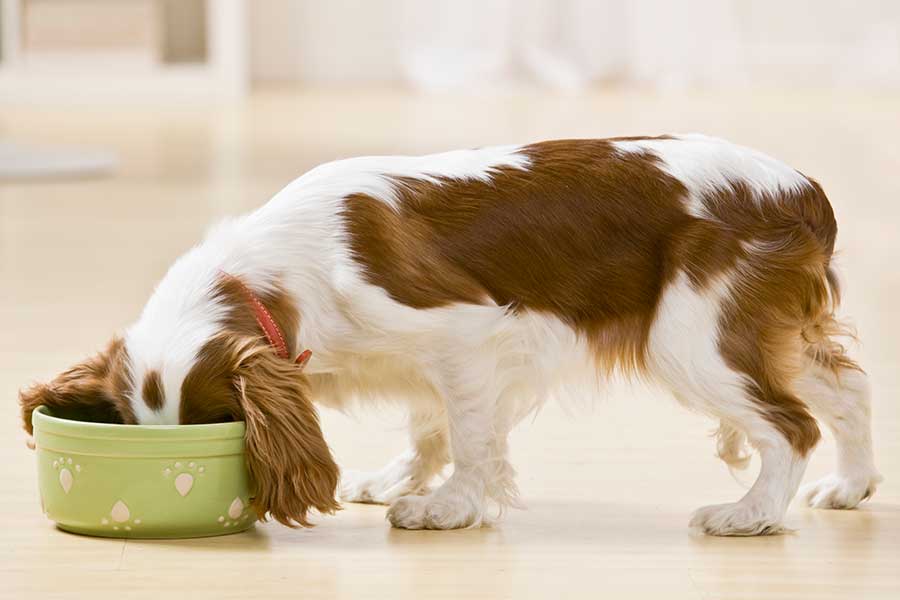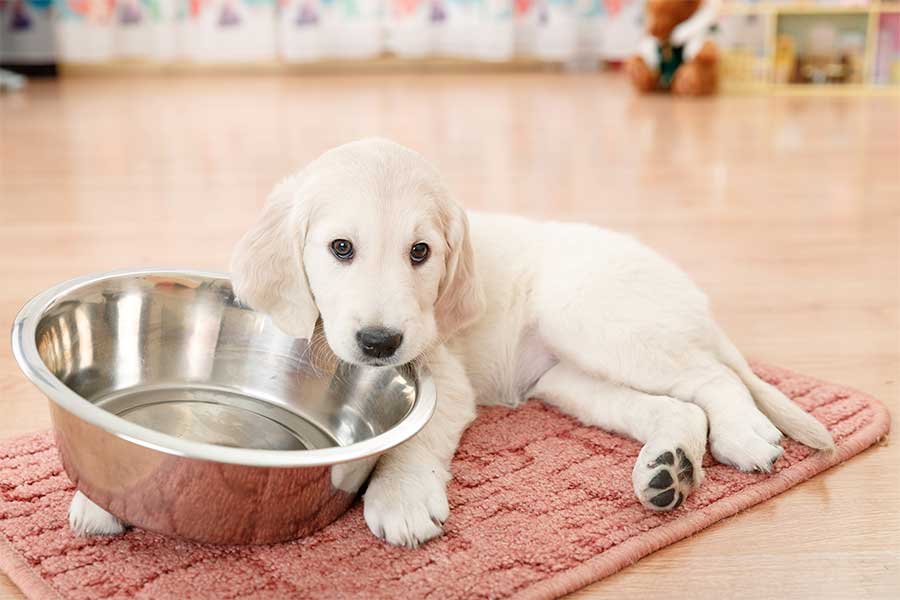Parenting a new pup is no walk in the park, what with their high energy levels, a constant need for love and attention, and an appetite that can put Michael Phelps to shame.
Although puppies are typically considered “adults” once they hit the one-year mark, our canine companions actually continue to grow and mature up until 24 months. During this time, their diet is extremely important to help ensure that they develop into healthy and active dogs.
Not only that, but certain diets have also been linked with potential health risks later on in your pup’s life, including hip dysplasia and dilated cardiomyopathy.
Perhaps this is why many new pup parents are so dead set on getting their pup only the best puppy food. But with so many options from so many brands available for the little tyke, which ones are actually good for her health?
To understand this, you must first understand your pup’s nutritional requirements.
 Puppy Nutrition 101 – Does Your Puppy Really Need Puppy Food?
Puppy Nutrition 101 – Does Your Puppy Really Need Puppy Food?
Here’s a question for you: why don’t we just feed our pups the same thing we feed our adult dogs? Why is there a separate category for puppy food?
No, it’s not just a gimmick. Puppy food is actually very different than adult dog food, which makes sense given that puppies have vastly different nutritional requirements than adult dogs. Because puppies are at a growing stage in their life, they need all the right nutrients to facilitate their development.
As such, puppy food typically contains a higher caloric and nutritional content than adult dog food to help budding puppies grow. Puppies require more protein (25%), fats (8%), sodium (0.3%), and calcium (1%) than adult canines. For further details about puppy macro and micronutrients, refer to this nutrient requirement chart by PetMD.
Not only that, but puppy food is also smaller in size and therefore easier on their fragile (albeit razor-sharp) teeth. If you try feeding your puppy adult dog food, they won’t be able to chew it and will probably choke on the large kibble.
Furthermore, the diet of large dog breeds needs to be strictly monitored and meticulously planned from puppyhood to prevent bone and joint problems.
For these reasons, Dr. Jamie Richardson of Small Door Veterinary recommends feeding your tyke formulations made specifically for them, at least until they are skeletally mature (between 12 to 24 months).
How to Read a Puppy Food Label
You should be able to tell whether a certain product counts as healthy puppy food or not. To do this, you need to know how to read the labels and ingredients listed on the package.
The most important thing to keep an eye out for, though, is an AAFCO-approved label. Puppy food manufacturers have to meet the nutritional standards set forth by the Association of American Feed Control Officials (AAFCO) profile.
Hence, the best puppy food must, first and foremost, have the following label (or something to a similar effect): “This product is formulated to meet the nutritional levels established by the AAFCO Dog Food Nutrient Profiles.”

7 Puppy Food Labels To Look Out For
Here is the list of eight things on your puppy’s food packaging that reveals a lot about its quality and nutritional content:
- Product name— if the product name says “chicken,” then at least 70% of the nutritional content should be from chicken. If, instead, it says “chicken entree” or “chicken platter,” then the chicken only accounts for 10% of the food content.
- Net weight of the product— knowing the quantity of the product helps you conduct a cost-per-ounce comparison between different puppy foods.
- Name and address of the manufacturer— you can always get in touch with the manufacturer if you have questions or concerns about the puppy food. Some manufacturers include a toll-free number that you can easily use. If the label says “manufactured for” or “distributed by,” then an outside party manufactured the food.
- Guaranteed analysis— this includes the minimum percentages of crude protein and fat, and the maximum percentages of crude fiber and moisture, as per the AAFCO standards.
- List of ingredients— the ingredients are listed in descending order from highest to lowest percentages.
- Intended animal species— which species is the food made for? (dogs, cats, puppies, kittens).
- Statement of nutritional adequacy— labels like “complete” or “balanced” aren’t adequate. “AAFCO-approved” is the most trustworthy nutritional adequacy statement.
- Feeding guidelines— a rough suggestion for serving sizes (cups per pounds of body weight) provided by the manufacturer.
Breed-Specific Puppy Food
There’s nothing inherently bad about breed-specific puppy food, but neither is there anything inherently good.
The truth is, breed-specific puppy food is simply unnecessary. Granted, some dog breeds have different nutritional needs vis-a-vis their size and medical predisposition. However, the best puppy food for small breeds or large breeds will be appropriate for all breeds.
So, you don’t really need breed-specific puppy food. Your pup’s vet or nutritionist can easily work around any dietary requirements by using all-breed foods.

7 Puppy Food For All Breeds
Here is a list of the seven best puppy foods appropriate for all breeds. These include both dry and wet puppy food options.
1.) Blue Buffalo Puppy Food
The Blue Buffalo Life Protection Formula is grain-containing dry puppy food containing deboned chicken, wholesome whole grains, and healthy fruits and veggies. The list of ingredients include:
- Chicken (no by-products)
- Brown rice
- Fish oil
- Blueberries
- Flaxseed
- Chicken meal
- Cranberries
It also contains Blue Buffalo’s proprietary “LifeSource Bits.” These are small granules of vitamins, minerals, and antioxidants that have undergone a cold-forming process, meaning that no nutrition is lost to heat.
The formula contains 27% protein and 16% crude fat, which is ideal for large dog breeds. However, pups of all shapes, sizes, and breeds can enjoy this nutrition-packed puppy food.
2.) Royal Canine Puppy Food
Royal Canin is a leading dog food brand, and for a good reason, too. While they have a wide selection to choose from, their canned wet puppy food is unmatched in terms of nutritional value. The ingredients include:
- Chicken (mainly by-products)
- Pork by-products
- Salmon
- Cornmeal
- Brewers rice and rice flour
- Vegetable oil
The formula contains 7.5% minimum protein and 4.0% fat. This makes it ideal for smaller breeds that may not have as many caloric requirements.
3.) Diamond Puppy Food
The Diamond Puppy Food Formula offers the perfect balance of fat, protein, and essential nutrients for the development of your puppy. Not only that, but it is also well-suited for pregnant and nursing dogs, thanks to its high protein and fat content. The ingredients include:
- Chicken by-product meal
- Whole grain ground corn
- Wheat flour
- Chicken fat
- Dried beet pulp
- Flaxseed
- Fish meal
- Salmon oil
The guaranteed analysis reveals that the kibble contains a minimum of 31% crude protein and 20% crude fat. This makes it ideal for large dog breeds, as well as puppies in need of weight gain.
4.) Pedigree Puppy Food
Like Royal Canin, Pedigree is also a well-established puppy food brand name among the canine community. Their Growth and Protection Formula contains the following ingredients:
- Ground whole grain corn
- Chicken by-product meal
- Corn gluten meal
- Soybean meal
- Meat and bone meal
- Animal fat
- Ground whole grain wheat
- Brewers Rice
Furthermore, the Growth and Protection formula hits the sweet spot vis-a-vis its guaranteed analysis. With 27% protein and 11% fat, this is the best puppy food for all breeds of all sizes.
5.) Nutrisource Puppy Food
Nutrisource is a family-owned dog food brand, and their medium and small-breed puppy food is a testament to their concern for your family dog’s wellbeing. It is a grain-inclusive kibble, and the main ingredients in this formula are:
- Chicken meal
- Chicken
- Brown rice
- Chicken fat
- Menhaden fish meal
- Oatmeal
- Barley
- Sunflower oil
- Flaxseed
According to the guaranteed analysis, the Nutrisource puppy food formula contains 31% crude protein and 21% crude fat.
6.) Iams Puppy Food
The Iams Chicken and Whole Grain Recipe is a veterinary-approved puppy food for budding, energetic, and lively pups. It is laden with antioxidants, essential minerals, and Omega-3 DHA for immune, skeletal, and cognitive development. The ingredients include:
- Chicken
- Ground whole grain corn
- Chicken by-product meal
- Ground whole grain sorghum
- Plain beet pulp
- Chicken fat
- Brewers Yeast
- Fish oil
Furthermore, the kibble comprises a minimum of 29% protein and 17.5% fat, making it the ideal puppy food for small and medium breeds.
7.) Science Diet Puppy Food
The Hills Science Diet Puppy Food is a flavor-and-nutrition-packed kibble formulated for the specific developmental needs of your pup. Furthermore, every purchase of Science Diet helps feed over 100,000 homeless animals every day, thanks to the brand’s shelter program.
The ingredients include:
- Chicken meal
- Whole grain wheat
- Cracked pearled barley
- Whole grain sorghum
- Whole grain corn
- Chicken fat
- Corn gluten meal
The guaranteed analysis for Science Diet Puppy Food reveals that the kibble contains a minimum of 29.8% protein and 19.1% fat.

Conclusion
Finding the best puppy food is a top-priority task for all puppy parents.
However, the surplus of options and nutritional information can be overwhelming sometimes. That’s not even considering the specific dietary needs that may emerge from genetic or medical conditions.
But now, you hopefully know the fundamentals about puppy nutrition and puppy food labels, the most important ones being the ingredients list, guaranteed analysis, and the AAFCO stamp of approval.
Now, you can rest assured knowing that your precious pup will live a long and healthy life, thanks to your rigorous efforts to provide them with the best puppy food.
